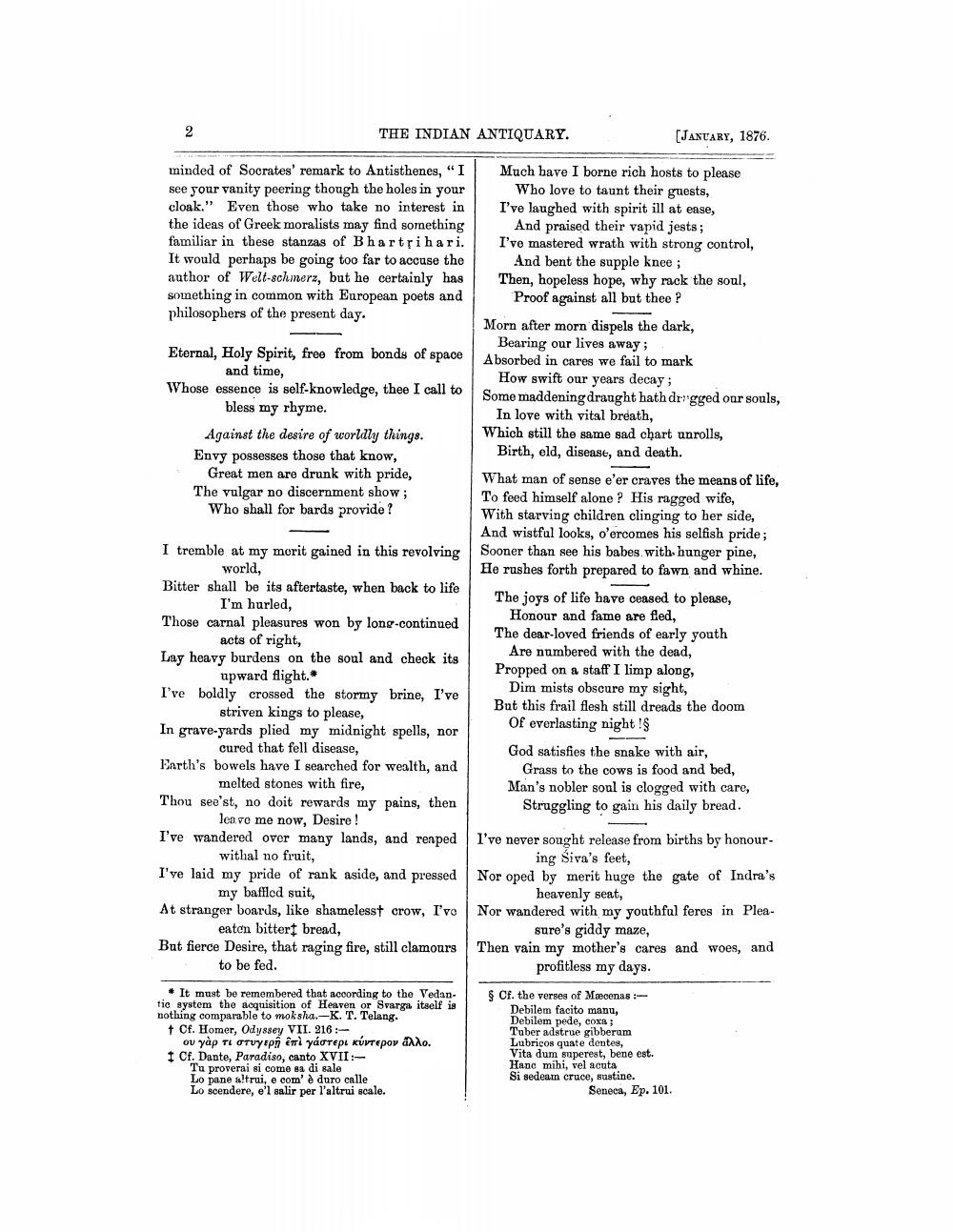Book Title: Indian Antiquary Vol 05 Author(s): Jas Burgess Publisher: Swati Publications View full book textPage 6
________________ 2 THE INDIAN ANTIQUARY. minded of Socrates' remark to Antisthenes, "I see your vanity peering though the holes in your cloak." Even those who take no interest in the ideas of Greek moralists may find something familiar in these stanzas of Bhartrihari. It would perhaps be going too far to accuse the author of Welt-schmerz, but he certainly has something in common with European poets and philosophers of the present day. Eternal, Holy Spirit, free from bonds of space and time, Whose essence is self-knowledge, thee I call to bless my rhyme. Against the desire of worldly things. Envy possesses those that know, Great men are drunk with pride, The vulgar no discernment show; Who shall for bards provide? Bitter shall be its aftertaste, when back to life I'm hurled, Those carnal pleasures won by long-continued acts of right, Lay heavy burdens on the soul and check its upward flight.* I've boldly crossed the stormy brine, I've striven kings to please, In grave-yards plied my midnight spells, nor cured that fell disease, Earth's bowels have I searched for wealth, and melted stones with fire, Thou see'st, no doit rewards my pains, then leave me now, Desire! I've wandered over many lands, and reaped withal no fruit, I tremble at my morit gained in this revolving Sooner than see his babes with hunger pine, He rushes forth prepared to fawn and whine. world, I've laid my pride of rank aside, and pressed my baffled suit, At stranger boards, like shamelesst crow, I've eaten bittert bread, But fierce Desire, that raging fire, still clamours to be fed. It must be remembered that according to the Vedantic system the acquisition of Heaven or Svarga itself is nothing comparable to moksha.-K. T. Telang. † Cf. Homer, Odyssey VII. 216: ου γὰρ τι στυγερῇ ἐπὶ γάστερι κύντερον ἄλλο. [JANUARY, 1876. Much have I borne rich hosts to please Who love to taunt their guests, I've laughed with spirit ill at ease, And praised their vapid jests; I've mastered wrath with strong control, And bent the supple knee; 1 Cf. Dante, Paradiso, canto XVII: Tu proverai si come sa di sale Lo pane altrui, e com'è duro calle Lo scendere, e'l salir per l'altrui scale. Then, hopeless hope, why rack the soul, Proof against all but thee? Morn after morn dispels the dark, Absorbed in cares we fail to mark Bearing our lives away; How swift our years decay; Some maddening draught hath dragged our souls, In love with vital breath, Which still the same sad chart unrolls, Birth, eld, disease, and death. What man of sense e'er craves the means of life, To feed himself alone? His ragged wife, With starving children clinging to her side, And wistful looks, o'ercomes his selfish pride; The joys of life have ceased to please, Honour and fame are fled, The dear-loved friends of early youth Are numbered with the dead, Propped on a staff I limp along, Dim mists obscure my sight, But this frail flesh still dreads the doom Of everlasting night!§ God satisfies the snake with air, Grass to the cows is food and bed, Man's nobler soul is clogged with care, Struggling to gain his daily bread. I've never sought release from births by honouring Siva's feet, Nor oped by merit huge the gate of Indra's heavenly seat, Nor wandered with my youthful feres in Pleasure's giddy maze, Then vain my mother's cares and woes, and profitless my days. § Cf. the verses of Maecenas :Debilem facito manu, Debilem pede, coxa; Tuber adstrue gibberum Lubricos quate dentes, Vita dum superest, bene est. Hanc mihi, vel acuta Si sedeam cruce, sustine. Seneca, Ep. 101.Page Navigation
1 ... 4 5 6 7 8 9 10 11 12 13 14 15 16 17 18 19 20 21 22 23 24 25 26 27 28 29 30 31 32 33 34 35 36 37 38 39 40 41 42 43 44 45 46 47 48 49 50 51 52 53 54 55 56 57 58 59 60 61 62 ... 438
